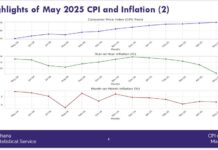Russia’s invasion of Ukraine and the ensuing threat of full-scale war could cost Ghana more than GH¢337million in direct export receipts, with another GH¢326million worth of imports likely to be affected, data obtained by the B&FT from the Ghana Export Promotion Authority (GEPA) indicate.
The numbers show that in 2021 the total value of exports to Russia – led by cocoa and shea derivatives – hit GH¢52.5million, while manganese and aluminum ores and concentrates accounted for GH¢285million in exports to Ukraine.
The cumulative value of exports over the past five years stands at GH¢155million and GH¢1.67billion to Russia and Ukraine respectively, the data show. Meanwhile, the total value of imports for the period stood at GH¢2.6billion from Russia and GH¢1.61billion from Ukraine.
The primary imports from Russia were ammonium nitrate, predominantly used in the manufacture of fertiliser, as well as semi-processed cereal grains including wheat.
Possible trade sanctions against Russia have heightened concerns of increased food inflation, as commodities like bread – which has recorded a 50 percent hike locally over the last six months – could see costs spiral out of control as Russia produces 20 percent of the wheat consumed globally.
The major imports from Ukraine include iron bars and rods, as well as sunflower oil.
Commenting on the situation, Dean of the University of Cape Coast (UCC) Business School, Professor John Gatsi, called for increased vigilance and anticipation – maintaining that on the balance of things, direct implications for the country remain fairly muted at the moment.
He explained that the volume and nature of the imports – which comprise mainly intermediate goods for further manufacturing – should ensure that direct pressure on the local currency from limited trade to these countries will be minimal.
“The kind of trade we engage in with these countries will not put unnecessary pressure on the currency, because we are engaging, more or less, in intermediate imports. When the import is in that area, it should not be considered to be too much of a problem for the economy,” Prof. Gatsi said.
The economist however noted that there could be dire implications for businesses whose sole export destinations are in the embattled region, as it could take them six to 18 months, on average, to negotiate trade contracts in other jurisdictions. This, he added, is especially concerning as trade between Ghana and these countries is on the ascendancy.
“It provides a spectrum of risk exposure in terms of trade, as well as for domestic manufacturing and remittances. If you look at our trade with these countries, it is on the ascendancy, on average, which means they are potential markets that are developing.
“When there is a truncation in trade, existing literature suggests that it takes a minimum of six to 18 months to enter into agreements with other trade destinations. What it means is that those businesses in Ghana whose sole destination is Russia and Ukraine will suffer largely if the situation worsens,” he said.
Bright spots?
Global commodity prices have reacted to the escalating tensions, with crude oil and gold – which had been on the ascendancy in the days leading to Russia’s invasion – hitting recent highs.
Crude oil surged past the US$100 barrier for the first time since 2014, while gold reached its highest value since 2020 – with spot gold trading 0.8 percent higher at US$1,925.07, as investors continue to seek refuge in more traditional asset classes.
Despite constituting two of the nation’s top exports, Prof. Gatsi was less than optimistic that increased receipts to the Treasury will trickle down to the streets.
Speaking about crude oil, he said: “The development will reflect on gains in the upstream, especially as government had made projections for the year using an average price of US$62 per barrel, and now it is around US$100 – and this could go higher if the situation persists. However, this would bring chaos at the pumps as the populace will feel it,” he said, ahead of an expected 15 percent hike in transportation fares across the country.
“The structure for utilisation of petroleum revenue in the country is deficient. And as such, we are unable to quickly transfer the windfall to support the downstream in instances such as this,” he added.










